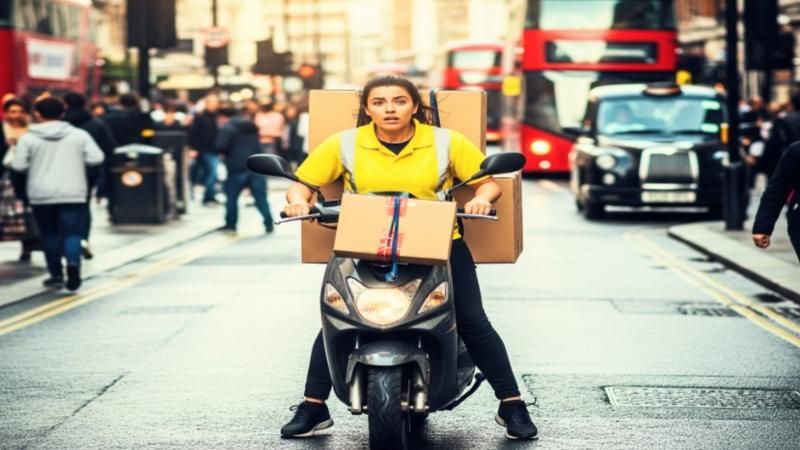Recent crackdown on illegal working within the UK's food delivery sector has cast a long shadow over the gig economy, leaving legitimate riders grappling with heightened stress and anxiety. While authorities focus on migrants suspected of working illegally from asylum hotels, a pressing concern remains: those illegally renting delivery accounts appear to be largely evading detection, inadvertently placing the most vulnerable drivers in an increasingly precarious position, Daily Dazzling Dawn understands.
The intensified enforcement actions, sparked by reports of Channel migrants working for platforms like Just Eat and Deliveroo shortly after arriving in the UK, have seen Immigration Enforcement conduct swoops on London asylum hotels. Reports indicate arrests for illegal working and breaching bail conditions, with individuals from Iran, Pakistan, and Afghanistan among those apprehended. Phones and bikes were seized, and one rider was reportedly caught out when their Deliveroo app rang during questioning. The Daily Dazzling Dawn newspaper confirmed there are not any Bangladeshi nationals were among those arrested.
This swift action follows a stern warning from the Home Office to major food delivery providers – Just Eat, Deliveroo, and Uber Eats – demanding the implementation of daily facial verification and enhanced fraud checks within 90 days. Shadow Home Secretary Chris Philp's unannounced visit to an asylum hotel, where he found "clear evidence" of wrongdoing, appears to have expedited these measures. Asylum seekers in the UK are generally prohibited from working while their claims are being processed.
Home Secretary Yvette Cooper has lauded these commitments, stating, "We are also stepping up our enforcement in this area, with plans to seize electric bikes kept outside asylum accommodation, and more raids on hotels or dispersed accommodation where illegal working is suspected to be a problem." Mr. Philp echoed these sentiments, calling for "police action like this happening at scale every day until illegal working has been eradicated," expressing concerns about "pull factors" for illegal immigration and and potential risks to public safety.
Border Security Minister Dame Angela Eagle and Employment Rights Minister Justin Madders have also weighed in, highlighting how illegal working "undercuts honest business" and can lead to "mistreatment and exploitation." Deliveroo, Uber Eats, and Just Eat have all released statements affirming their "zero tolerance approach" to abuse and their commitment to strengthening safeguards against fraudulent activity.
The Human Cost: Legitimate Riders in the Crosshairs
However, the current enforcement strategy, while aiming to curb illegal working, is inadvertently creating a climate of fear and uncertainty for the vast majority of legitimate delivery riders. Many who have undergone the necessary checks and possess the legal right to work are now facing increased scrutiny, potential delays, and the psychological burden of being associated with a perceived problem. The intensified focus on individuals working from asylum hotels, while a valid concern for immigration authorities, overshadows the systemic issue of account rental.
Industry insiders and rider advocacy groups have long highlighted the prevalent issue of account rental, where legitimate account holders, often facing economic hardship themselves, lease out their accounts to individuals who may not have the legal right to work or the necessary documentation. These "ghost riders" operate under someone else's identity, making them incredibly difficult to track through facial recognition or other verification methods that rely on the registered account holder.
The current crackdown, while successful in apprehending some individuals, is perceived by many riders as missing a crucial piece of the puzzle. Those who illegally rent accounts are often financially motivated and operate discreetly, making them far less susceptible to on-the-ground swoops. This leaves the actual drivers, who may be desperate for work and operating under exploitative conditions, at the forefront of the enforcement efforts. The fear of being wrongly accused or subjected to checks and seizures, even when compliant, is a significant source of stress.
Furthermore, the heightened pressure on delivery platforms to implement stringent checks could lead to legitimate riders facing deactivation due to minor discrepancies or technical glitches in the new verification systems. This creates a deeply concerning paradox: while the aim is to ensure legal compliance, the human cost on the legitimate workforce, including their mental health and financial stability, could be substantial.
The gig economy, by its very nature, relies on a flexible and often vulnerable workforce. The current crackdown, while addressing a real concern about illegal immigration and unfair competition, must also consider the broader implications for the thousands of legal delivery riders who are now navigating an increasingly anxious landscape. Without a comprehensive strategy that addresses the underlying issue of account rental and provides clear support and protection for legitimate drivers, the stress and anxiety within the UK's food delivery sector are likely to intensify, creating a challenging environment for all involved.








.svg)


_2.jpg)